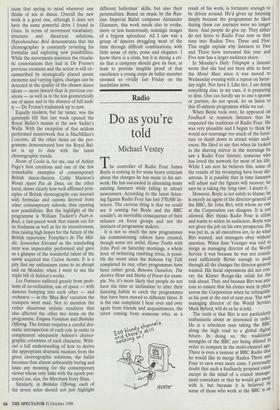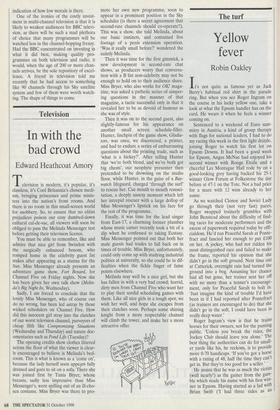Radio
Do as you're told
Michael Vestey
The controller of Radio Four James Boyle is coming in for some heavy criticism about the changes he has made to his net- work. He has succeeded in alienating many existing listeners while failing to attract newcomers. According to the latest listen- ing figures Radio Four has lost 570,000 lis- teners. The curious thing is that we could see it coming but Boyle and the BBC couldn't, an inevitable consequence of their reliance on focus groups and not the instincts of programme makers.
It is not so much the new programmes his commissioning editors have created, though some are awful. Home Truths with John Peel on Saturday mornings, a whole hour of twittering rambling trivia, is possi- bly the worst since the hideous Veg Talk completed its run; other programmes have been rather good, Between Ourselves, The Archive Hour and Matrix of Power for exam- ple. No, it's more likely that people do not have the time or inclination to alter their listening habits to catch the programmes that have been moved to different times. It is the one complaint I hear over and over again from friends and acquaintances, the latest coming from someone who, as a
result of his work, is fortunate enough to be driven around. He'd given up listening simply because the programmes he liked during these car journeys were no longer there. And people do give up. They either do not listen to Radio Four now or they tune into Radios Two, Three and Five. This might explain why listeners to Two and Three have increased this year and Five now has a larger audience share.
In Monday's Daily Telegraph a listener wrote that she had not been able to hear the Moral Maze since it was moved to Wednesday evening with a repeat on Satur- day night. Nor have I. Like her, I am doing something else; in my case, it is preparing to dine. One can hardly say to one's spouse or partner, do not speak, let us listen to this 45-minute programme while we eat.
When Boyle took over, he appeared on Feedback to reassure listeners that he respected the traditions of Radio Four. He was very plausible and I began to think he would not rearrange too much of the furni- ture or dumb down to attract wider audi- ences. He liked to say that when he looked in the shaving mirror in the mornings he saw a Radio Four listener, someone who has loved the network for most of his life. While I am sure he believes this, some of the results of his revamping have been dis- astrous. It is possible that in time listeners will adjust and the figures will recover; he says he is taking the 'long view'. I doubt it. However, Boyle is not solely to blame; he is merely an agent of the director-general of the BBC, Sir John Birt, with whom no one at the Corporation can disagree. It is not allowed. Birt thinks Radio Four is elitist and wants to widen its audiences. Boyle was not given the job on his own prospectus. He was put in, as all executives are, to do what Birt wanted, and managers obey without question. When Sam Younger was told to resign as managing director of the World Service it was because he was not consid- ered sufficiently Birtist enough to push through all the changes the director-general wanted. His facial expressions did not con- vey the Khmer Rouge-like relish for the task ahead. That, and because Birt was anx- ious to ensure that his clones were in place across the Corporation when he relinquish- es his post at the end of next year. The new managing director of the World Service, Mark Byford, will do as he is told. The truth is that Birt is not particularly enthusiastic about or interested in radio. He is a television man taking the BBC along the high road to a global digital future. In doing so, the traditional strengths of the BBC are being diluted In order to compete in the multi-channel age. There is even a rumour at BBC Radio that he would like to merge Radios Three and Four to save even more costs. I personally doubt that such a foolhardy proposal exists except in the mind of a crazed manage- ment consultant or that he would get away with it, but because it is believed by some of those who work at the BBC is an indication of how low morale is there.
One of the ironies of the costly invest- ment in multi-channel television is that it is likely to weaken audiences for BBC televi- sion, as there will be such a mad plethora of choice that many programmes will be watched less in the channel-hopping frenzy. Had the BBC concentrated on investing in what it did best, making quality pro- grammes on both television and radio, it would, when the age of 200 or more chan- nels arrives, be the sole repository of excel- lence. A friend in television told me recently that he had access to something like 90 channels through his Sky satellite system and few of them were worth watch- ing. The shape of things to come.



















































































 Previous page
Previous page